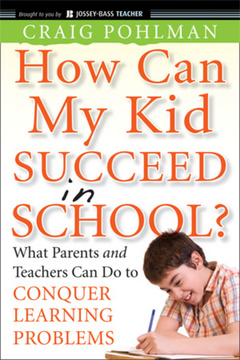How Can My Kid Succeed in School? What Parents and Teachers Can Do to Conquer Learning Problems
Auteur : Pohlman Craig

What to look for when a child is struggling in school and what can be done at home and at school to help them succeed
This practical resource for parents and teachers explains how to understand a child's complete learning profile-an inventory of his or her unique strengths and weaknesses-and provides helpful strategies that can be used at school and at home to get the child on a path to success. The book walks readers through the process of gathering clues about the child's learning style and provides guidelines for selecting the most appropriate learning strategies that will help spell success in school and life. Pohlman shows how parents and teachers can collaborate to help kids become successful learners, and also guides readers through the process of getting an educational assessment, for those students with particularly challenging issues.
- Helps readers understand what's going on when a child is struggling in school
- Explains what to look for at home and at school to gather "clues" to understanding a child's learning profile
- Shows how parents and teachers can collaborate to help a child or adolescent succeed at school
- Includes guidelines on obtaining educational assessments
- Pohlman, from the acclaimed All Kinds of Minds Institute, has conducted or supervised thousands of assessments of struggling learners
The author vii
Preface xiii
Introduction 1
Part One Conquering learning problems at home 11
1 Looking for clues at home 13
Starting Pointers 14
Deciphering the Clues 16
Making Discoveries During Homework Time 17
Locating Clues in Work Samples 27
Detective Work During Down Time 44
Deciphering Disorganization 53
Bottom Line 55
2 Picking strategies for home 57
Starting Pointers 58
Strategies for Unreliable Attention 60
Strategies for Memory Gaps 66
Strategies for Limited Language 73
Strategies for Weak Graphomotor Function 79
Strategies for Shaky Concepts and Reasoning 82
Talking About Learning 84
Bottom Line 87
Part Two Conquering learning problems at school 89
3 Looking for clues at school 91
Starting Pointers 92
Observing During Independent Work 94
Clues Emerging from Student Interactions 99
Detective Work During Downtime 107
Locating Clues in Work Samples 109
Deciphering Disorganization 117
Bottom Line 120
4 Picking strategies for the classroom 123
Starting Pointers 123
Strategies for Unreliable Attention 125
Strategies for Memory Gaps 130
Strategies for Limited Language 137
Strategies for Weak Graphomotor Function 143
Strategies for Shaky Concepts and Reasoning 144
Talking About Learning 146
Bottom Line 147
Part Three When more help is needed 149
5 Being a “smart shopper” for educational assessments 151
Starting Pointers 152
When Is It Time for an Expert? 153
Search Criteria: Picking the Right Expert 155
What Makes a Good Written Report? 160
You Get What You Ask For: Effective Referral Questions 164
Bottom Line 165
6 Getting the most out of the assessment process 169
Starting Pointers 169
Share What You Know 170
Head Off Simplification 173
Observing the Assessment 182
Bottom Line 186
7 Using what you’ve learned from the assessment 189
Starting Pointers 189
Keeping Your Sights on Insights 190
Navigating Paths to Success 198
Finding a Good Tutor (If You Need One) 199
Keeping Tabs 202
Bottom Line 205
Conclusion 207
Things to Let Go Of 209
Things to Hold On To 212
Appendix one: profile worksheet 215
Appendix two: case story index 217
Appendix three: atlas of neurodevelopmental terms 223
Appendix four: glossary of academic skills 239
Appendix five: glossary of testing terms 251
Index 257
Craig Pohlman, Ph.D., directs learning assessment and consultation services at Southeast Psych in Charlotte, North Carolina. Pohlman is a highly regarded expert in learning and in improving the success of struggling students. He has conducted or supervised several thousand assessments of children with learning difficulties. Pohlman routinely authors articles and conducts workshops for parents, educators, and clinicians. He is the author of Revealing Minds from Jossey-Bass.
Date de parution : 09-2009
Ouvrage de 288 p.
15.2x22.9 cm
Thème de How Can My Kid Succeed in School? What Parents and... :
Mots-clés :
student?s learning profile, creating a learning profile, what is a learning profile?, working with learning profiles, successful learning strategies, strategies for working with challenging students, working with difficult students, helping a child succeed, helping my kid succeed, what?s going on with my kid, helping kid at school, helping teenager at school, kid struggling at school, learning problems, school problems, problems at school, learning challenges, ADHD, ADD, learning disabilities, bad grades, all kinds of minds, a mind at a time, struggling readers, struggling learners, reluctant readers remedial reading, parent involvement and writing, improving reading and writing in the classroom, improving literacy in the classroom, comprehension, reading comprehension, literacy and language, language arts, academic language, reading strategies, remedial reading, struggling readers, readers at risk, differentiated instruction, struggling learners



